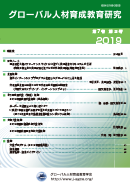Volume 7, Issue 2
Displaying 1-8 of 8 articles from this issue
- |<
- <
- 1
- >
- >|
-
2019 Volume 7 Issue 2 Pages i
Published: 2019
Released on J-STAGE: September 29, 2021
Download PDF (503K)
-
2019 Volume 7 Issue 2 Pages 1-6
Published: 2019
Released on J-STAGE: September 29, 2021
Download PDF (1028K)
-
2019 Volume 7 Issue 2 Pages 7-13
Published: 2019
Released on J-STAGE: September 29, 2021
Download PDF (1161K) -
2019 Volume 7 Issue 2 Pages 14-21
Published: 2019
Released on J-STAGE: September 29, 2021
Download PDF (1629K)
-
2019 Volume 7 Issue 2 Pages 22-33
Published: 2019
Released on J-STAGE: September 29, 2021
Download PDF (2579K) -
2019 Volume 7 Issue 2 Pages 34-35
Published: 2019
Released on J-STAGE: September 29, 2021
Download PDF (1555K) -
2019 Volume 7 Issue 2 Pages 36-37
Published: 2019
Released on J-STAGE: September 29, 2021
Download PDF (1259K) -
2019 Volume 7 Issue 2 Pages 38-40
Published: 2019
Released on J-STAGE: September 29, 2021
Download PDF (1133K)
- |<
- <
- 1
- >
- >|
